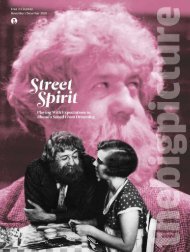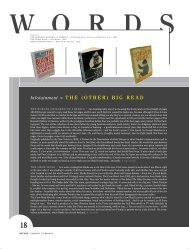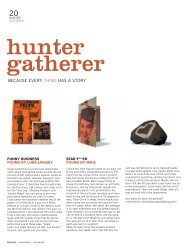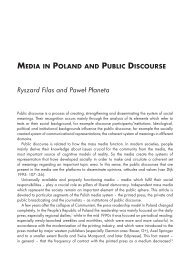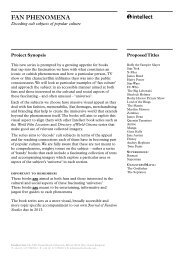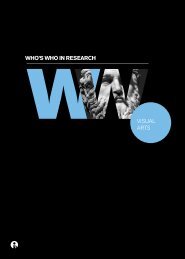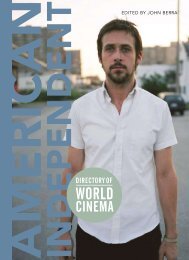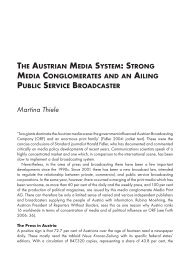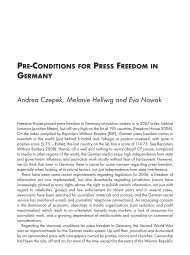Anthem - Intellect
Anthem - Intellect
Anthem - Intellect
You also want an ePaper? Increase the reach of your titles
YUMPU automatically turns print PDFs into web optimized ePapers that Google loves.
<strong>Anthem</strong><br />
modern elites cannot make this official EU policy. Except for all three having been<br />
recontextualised from their original uses to their respective new uses, in musical<br />
or lyrical terms none of them induce any strong sense of dislocation. There are no<br />
obvious associations to hybridity except maybe in the way the UEFA arrangement<br />
modifies the baroque style to a rather different expression, but all three may perhaps<br />
be said to embody some kind of pleasure and desire, at least in a general sense of<br />
musical luster, and to some listeners even provide sublime shivers of enjoyment.<br />
(3) There are hundreds of other musical symbols of Europe, if counting not only<br />
tunes representing various European organisations but also programmatic art music<br />
and popular songs with lyrics that characterise Europe and Europeanness. I will here<br />
focus on the latter kind, and in particular songs presented in EBU’s ESC. Among<br />
the more than one thousand songs performed in the ESC finals 1956–2010, five had<br />
‘Euro’ in their titles and a lyrical topic that explicitly thematised Europeanness—the<br />
Belgian Telex: ‘Euro-vision’ (1980), the French Cocktail Chic: ‘Européennes’ (1986),<br />
the Irish Liam Reilly: ‘Somewhere in Europe’ (1990), the Italian Enrico Ruggeri: ‘Sole<br />
D’Europa’ (1993) and the Spanish Rosa: ‘Europe’s Living a Celebration’ (2002). To<br />
these should be added the winner of 1990, Italian Toto Cotugno’s ‘Insieme 1992’ with<br />
its repeated chorus line ‘Insieme, unite, unite, Europe’. 434<br />
In 1980, Telex’s ‘Euro-vision’ (by H. Dirks = Jacques Duvall = Eric Verwilghen)<br />
gave Belgium a seventeenth position (third last) in the Dutch Hague finale. Three<br />
men in black suits, blue shirts and white scarves—the singer surrounded by two synth<br />
players performed a kind of comic song, the singer ending by pouring out golden<br />
confetti (apparently symbolising the European stars, in a double sense) from his<br />
pockets and then taking out a mini camera to take a photo of the audience/camera,<br />
while the first two bars of Charpentier’s Eurovision theme is heard played with a thin,<br />
plastic sound. Both the performance and the (French) lyrics are distanced, ironically<br />
mocking the whole event in which they take part. The first verse talks of beautiful<br />
singers nervously getting ready: ‘May the best win / The borders are open.’ The chorus<br />
just monotonously repeats ‘Eurovision, Eurovision’. The link between stars and media<br />
is tight: ‘Old Europe cheers the country that wins’; ‘The eyes of the whole world are<br />
waiting, impatiently / for news flashes / that are going to announce / by satellite and<br />
by shielded cables / what’s happening in their regions’. The song thus depicts the ESC<br />
itself as an artificial media event, with only one clear hint towards identifying Europe,<br />
namely that it is ‘old’, which links to a tradition of seeing Europe as endowed with a<br />
mature civilisation but can in retrospective also be seen as confirming the western<br />
confines of how it was then defined.<br />
In 1986 in Norwegian Bergen, France also stood as number 17 (of 20) with Cocktail<br />
Chic’s ‘Européennes’ (by Michel and Georges Costa). The quartet of female singers were<br />
dressed in much gold and typical 1980s’ outfit (poodle hairstyle, long wide sweeping<br />
coats) and made simple, synchronised gestures. The lyrics talk of ‘European girls’ who<br />
189



